For loving pet parents, the question of What Foods Can Dogs Eat And Cannot Eat is paramount. While sharing human food with our furry companions might seem like a harmless act of affection, it’s crucial to understand that canine digestion and metabolism differ significantly from our own. Many common household foods can be your dog’s best friend or their worst enemy, with some being toxic even in very small amounts. Pet poisonings are a genuine threat, with hundreds of thousands occurring in the United States annually, and household foods are a major contributor.
This guide aims to provide you with a comprehensive “cheat sheet” to help you navigate the complexities of your dog’s diet, ensuring your beloved companion stays safe and healthy. Understanding what are you not supposed to feed your dog is just as important as knowing what treats are safe to share.
Why Certain Foods Are Toxic to Dogs
The fundamental reason many human foods are harmful to dogs lies in their unique physiological makeup. Dogs process certain substances very differently. For instance, theobromine and caffeine in chocolate are metabolized much slower by dogs than by humans. This slow processing means these substances can rapidly build up in a dog’s system, potentially leading to fatal consequences. Similarly, while cherries are safe for humans, the cyanide found in their pits, stems, and leaves can be problematic in large quantities for dogs. Moreover, the pits themselves are difficult for dogs to digest and can cause gastrointestinal upset.
Food toxicity can also be influenced by a dog’s size, breed, and overall health condition. A tiny chihuahua will react differently to a toxic substance than a large Great Dane. Therefore, if you ever have questions or concerns about foods your dogs can’t eat, always consult your veterinarian.
Common Foods Dogs Cannot Eat
Many everyday household foods are dangerous, and often toxic, to dogs. This list compiles some of the most common foods that are bad for dogs. While extensive, remember it’s not an exhaustive list. If in doubt, it’s always safer to avoid giving your dog a particular food.
Alcohol
Because pets are significantly smaller than humans, alcohol can have a far deadlier effect on them. Even minuscule amounts can cause harm, and the risk increases with smaller body size. Symptoms of alcohol poisoning in dogs mirror those in humans, including vomiting, breathing difficulties, coma, or even death.
Apple, Apricot, Cherry, and Plum Seeds/Pits
While the fleshy part of apples is generally safe, the core and seeds are not. Apple seeds contain cyanide, and though small amounts might not be immediately problematic, it’s best to avoid them entirely. Similarly, apricot, cherry, peach, and plum seeds and pits should be avoided due to their cyanide content. Ingestion can lead to severe symptoms like vomiting, irregular heartbeats, seizures, coma, and even death, as red blood cells are unable to properly carry oxygen.
Avocado
Avocados are not a suitable food choice for dogs. There have been reported cases of myocardial damage (heart muscle damage) in dogs after consuming avocados. While these specific results have not been consistently replicated, avocados are known to cause issues in other mammal species. Additionally, an intact avocado pit poses a significant risk of obstructing a dog’s gastrointestinal tract. Therefore, it’s safest to keep this fruit away from your canine companion.
Broccoli
Broccoli contains isothiocyanates, which can be harmful to pets in very large doses. While small amounts might be occasionally acceptable, it’s generally best to avoid them, especially given the abundance of other healthy and safe vegetable options. Broccoli stalks can also be a choking hazard or cause an obstruction in a dog’s throat.
Caffeine and Coffee Grounds
Caffeine contains methylxanthines, compounds that can cause potentially fatal symptoms such as diarrhea, vomiting, seizures, and irregular heartbeat in dogs. Accidental ingestion of coffee grounds or highly caffeinated beverages can lead to a racing heart, tremors, arrhythmia, breathing difficulties, and other severe symptoms.
Chicken and Turkey Skin, Ham, and Other Fatty Cuts of Meat
Fatty cuts of meat, including ham and the skin from chicken or turkey, should be avoided. Their high-fat content can trigger acute pancreatitis in dogs, a life-threatening illness with severe complications. Furthermore, never give cooked turkey or chicken bones to dogs, as they can splinter and cause bowel obstruction or damage to the stomach and intestines, potentially leading to fatal abdominal infections.
Chocolate
Chocolate toxicity is a frequent cause of pet poisoning. Dogs absolutely cannot eat any chocolate product. Chocolate contains a lethal component called theobromine, with darker chocolates containing higher concentrations. Chocolate also contains caffeine, and some sugar-free varieties may contain xylitol, both of which are toxic to dogs. Dogs and cats metabolize chocolate far less efficiently than humans. Symptoms range from hyperactivity, vomiting, diarrhea, and pancreatitis to abnormal heart rhythms and seizures. If your dog ingests any amount of chocolate, contact your veterinarian immediately.
Grapes and Raisins
Grapes and raisins are highly dangerous to dogs, capable of causing severe issues like kidney failure due to their tartaric acid content, which is toxic to canine kidneys. Even a small number of grapes or raisins can wreak havoc. Symptoms of poisoning include vomiting, diarrhea, loss of appetite, changes in urine output, or complete anuria (absence of urine).
Macadamia Nuts, Almonds, and Pistachios
Macadamia nuts are particularly toxic to dogs, causing painful symptoms such as weakness, overheating, and vomiting. The exact mechanism of toxicity remains somewhat mysterious, but as few as six nuts can cause severe poisoning in a small dog. While macadamia nuts are the most dangerous, other nuts like pistachios and almonds can pose choking hazards or become problematic if flavored or spiced.
Milk and Dairy Products
Dairy products should be given with caution. While some dogs can tolerate milk and dairy, many are lactose intolerant or allergic, experiencing diarrhea and gas after consumption. Ice cream is also unsuitable due to its high sugar and fat content. As for cheese, small quantities of lower-fat varieties can be an occasional treat, but high-fat cheeses should be avoided.
Mushrooms
It’s best to err on the side of caution and prevent your dog from eating any mushrooms. Wild mushrooms can contain various toxins that may lead to kidney and liver failure, vomiting, diarrhea, hallucinations, and red blood cell damage. While washed, white grocery store mushrooms might be safe, choosing a different, safer treat is always preferable.
Nutmeg and Cinnamon
Nutmeg should never be given to dogs, as it can cause hallucinations and severe vomiting. The culprit is myristicin, a compound in nutmeg, with its effects being strongest in high doses or for small dogs. If your dog ingests any amount of nutmeg, contact your veterinarian. Cinnamon, while not toxic, can irritate your dog’s mouth and potentially lead to low blood sugar, which can have serious health implications.
Onions, Garlic, Chives, and Leeks
Many pet owners are unaware that herbs from the allium family, such as onions, garlic, chives, and leeks, are unsafe for dogs. These plants contain sulfoxides and disulfides, which can damage red blood cells and cause anemia in both dogs and cats. Onion and garlic powders are common in prepared foods, so always read labels carefully. All allium plants can cause potentially fatal anemia in dogs, with certain Japanese breeds like Akitas and Shiba Inus being particularly sensitive. If you’re wondering what in onions is bad for dogs, it’s these sulfoxides and disulfides.
Salt
Excessive salt intake can disrupt the fluid balance in a dog’s cells, leading to tremors, seizures, diarrhea, or even a coma. Whether it’s rock salt, homemade play dough, or potato chips, resist those pleading eyes to protect your dog’s health.
Spicy Food
Keep your dog away from spicy foods. Hot, spicy ingredients can cause vomiting, stomach ulcers, or diarrhea, leading to considerable discomfort for your pet and potentially expensive emergency vet visits.
Sugar-Free Gum and Candy (Xylitol)
Xylitol, a common artificial sweetener found in many sugar-free human foods like gum, candy, and baked goods, is highly toxic to dogs. Ingestion can cause a rapid and dangerous drop in blood sugar, leading to weakness and seizures. Some dogs may also develop liver failure. Xylitol poisoning cases are on the rise, and as little as five pieces of gum containing xylitol can be fatal to a 65-pound dog.
Tomatoes and Raw Potatoes
Tomatoes and potatoes fall into the category of “safe in some forms, unsafe in others.” A ripened red tomato is generally acceptable. However, the green parts of the tomato plant and green, unripe tomatoes contain solanine, which is toxic to dogs. Similarly, baked or boiled potatoes without additives are generally safe in small quantities, but raw potatoes contain solanine and are toxic.
Tobacco
Tobacco and nicotine-containing products are dangerous and unhealthy for dogs. Exposure can cause a range of symptoms including vomiting, diarrhea, rapid breathing, agitation, abnormal heart rate, wobbliness, muscle weakness, fluctuating blood pressure, seizures, and tremors. More significant exposure can lead to blue gums and coma, potentially becoming fatal. If your dog ingests tobacco, immediate veterinary attention is crucial.
Yeast and Raw Dough
Yeast and raw dough pose multiple threats to dogs. The raw dough can expand in the stomach, causing severe pain and potentially life-threatening gastric torsion or rupture. Additionally, the yeast and sugar in raw dough can ferment, producing alcohol and leading to alcohol toxicity, which requires immediate medical intervention and can quickly become fatal.
Raw Meat
Never feed your dog raw or undercooked meat. Raw meat can harbor harmful bacteria like Salmonella or E. coli, which are dangerous to dogs as well as humans. Bones in raw meat also present a choking hazard.
Rhubarb
Rhubarb, often used in desserts, is not safe for pets. Its leaves contain soluble calcium oxalate crystals. Ingested in sufficient quantities, these can bind with calcium in the body, causing a dangerous drop in calcium levels and potentially leading to renal (kidney) failure. Symptoms include tremors, weakness, drooling, bloody urine, changes in thirst and urination, and vomiting. This is an important consideration when thinking about what fruits and vegetables are not good for dogs.
Star Fruit
Like rhubarb, star fruit also contains soluble calcium oxalate crystals and should not be given to your dog.
Flavored Water and Seltzer Water
It’s best to stick to fresh, clean water for your dog rather than anything flavored or carbonated. Flavored and seltzer waters can contain added ingredients like sugar or salt that are dangerous to pups. Plain seltzer water might be acceptable in small, urgent situations but could cause gas and bloating.
Safe Foods for Dogs
While the list of forbidden foods can seem daunting, there’s also an extensive list of safe and healthy human foods that your dog can enjoy. Some popular options include dehydrated chicken or beef (in very small amounts), apples (without the core), green beans, and carrots.
Here are some common and popular foods that your dog can safely eat, helping you answer the question, “what foods can dogs eat and cannot eat” on the positive side.
Apples, Oranges, and Bananas
The fleshy parts of apples, without the core and seeds, are perfectly fine for dogs. Always remove the core and seeds to avoid cyanide and choking hazards. Oranges are safe in small amounts. Bananas, peeled and in moderation, also make a tasty and healthy treat.
Blueberries and Blackberries
Blueberries are excellent treats that many dogs love. They are packed with antioxidants, fiber, phytochemicals, and vitamin C, all beneficial for your pup’s health. Blackberries offer similar nutritional benefits and are also safe.
Cantaloupe, Mango, Peaches, Pears, Pineapples, and Watermelon
A variety of fruits can be safely enjoyed by your dog. Cantaloupe is a great starting point. Watermelon, with rinds and seeds removed (including the pale seeds in seedless varieties to prevent choking), is especially refreshing on warm days due to its high water content. Mangoes, peaches, pears, and pineapples are also safe in moderation; just ensure all seeds, pits, and cores are removed before serving.
Carrots, Cucumber, and Celery
When considering what veggies dogs can’t eat versus what they can, remember the three C’s: carrots, cucumbers, and celery. These vegetables are excellent, low-calorie options, particularly for overweight dogs. Bite-sized carrot pieces offer a satisfying crunch, celery can help with bad breath, and cucumber slices are rich in vitamins and minerals with minimal carbohydrates or fats.
Cheese
While milk and dairy should generally be limited, small amounts of cheese are acceptable for dogs who are not lactose intolerant. Opt for lower-fat varieties like mozzarella as an occasional treat, as high-fat cheeses can be problematic.
Eggs
Fully cooked eggs are a nutritious and enjoyable treat for dogs. Scrambled eggs, in particular, can be soothing for an upset stomach and provide a good source of protein.
Peanuts, Peanut Butter, and Cashews
Peanuts and cashews are safe for dogs in small quantities. However, due to their high-fat content, they should be given sparingly and must be unsalted, unflavored, and unseasoned. Peanut butter, in moderation, is a delicious, protein-rich treat. Always choose unsalted varieties and meticulously avoid any sugar-free options containing xylitol.
Popcorn and Corn
Air-popped, unsalted, and unbuttered popcorn can be a fun treat. Ensure all unpopped kernels are removed to prevent choking. Similarly, corn (removed from the cob) is acceptable when served plain, without butter, salt, or spices.
Coconut and Honey
In small amounts, coconut (including coconut milk and oil) is fine for dogs. It contains lauric acid and may even assist with allergies. However, some dogs might experience stomach upset from fresh coconut or coconut milk, so introduce it cautiously. Avoid coconut water, which is unsafe, and the furry shell, which is a choking hazard. Honey, in moderation, is also safe and offers beneficial vitamins and minerals.
Shrimp and Fish
Plain, fully cooked shrimp is a great choice for dogs. Ensure the shell, head, tail, and legs are removed, and avoid any seasoned, salted, or buttered preparations. Fish, especially salmon and sardines, is also permissible. It must be plain, fully cooked, and boneless. A general guideline is to offer fish no more than twice a week. Plain, canned tuna (packed in water, not oil) is safe in moderation to limit mercury and salt intake.
Turkey
Turkey meat is healthy and safe for dogs once the skin, fat, and bones are removed. Small bites of plain, unseasoned, and unsalted turkey are a delicious protein source. This also answers a common question about what human meat can dogs eat.
Grains, Wheat, and Quinoa
Grains like wheat and corn, in small amounts, are generally fine for dogs. Quinoa is often considered a healthier filler option. Always monitor your dog for any signs of allergic reactions when introducing new grains.
Green Beans
Many dogs thoroughly enjoy green beans, whether raw, steamed, or from a can. They are safe, tasty, and healthy. Choose raw or plain-cooked green beans without added spices, oils, or salt, and cut them into small pieces to prevent choking.
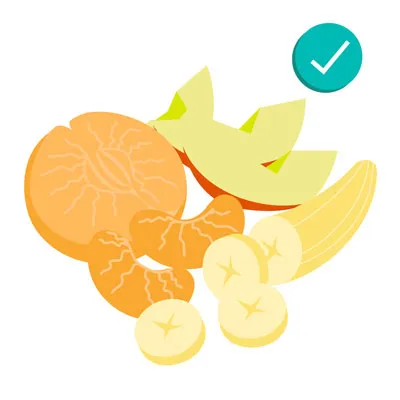 A person offering a dog a small piece of apple without seeds or core.
A person offering a dog a small piece of apple without seeds or core.
What Dogs Are Most at Risk if They Consume Toxic Foods?
While all dogs should be protected from toxic foods, certain groups are at higher risk:
- Small breeds vs. large breeds: Smaller dogs are more vulnerable due to their lower body weight, making them more susceptible to substances like chocolate.
- Puppies: Young dogs have less developed digestive and immune systems, increasing their risk from certain substances.
- Elderly dogs: Older dogs may be at higher risk due to pre-existing health conditions.
- Dogs with pre-existing conditions: Conditions like diabetes or kidney disease can significantly increase a dog’s vulnerability to toxic foods.
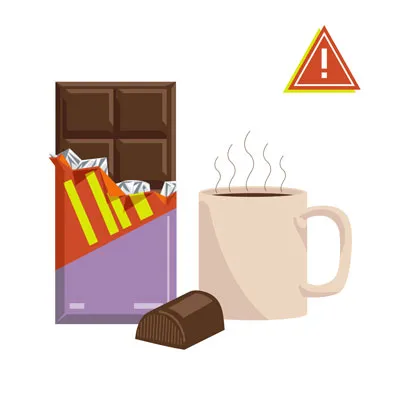 A small dog looking curiously at a piece of chocolate, which is highly toxic.
A small dog looking curiously at a piece of chocolate, which is highly toxic.
How To Prevent Dogs from Eating Toxic Foods
While accidents can happen, proactive steps can significantly reduce the risk of your dog ingesting unsafe human foods.
1. Store Foods Out of Reach
Ensure all toxic foods are inaccessible to your dog. Keep dangerous items on high shelves or securely locked away in cabinets that your pup cannot open.
2. Avoid Feeding Dogs from Your Plate
Do not feed your dog directly from your plate or while you are cooking in the kitchen, even if you intend to give them a safe treat. This practice can encourage begging and make it harder for your dog to distinguish between safe and unsafe foods. It’s safest to only offer treats specifically formulated for dogs.
3. Educate Family Members and Guests
Inform all family members, including children, and any guests about the importance of not sneaking food to your dog, no matter how tempting it may be.
4. Be Careful During Holidays
Exercise extra caution during holidays and busy seasons. The commotion and abundance of food can make it easy to let your guard down, increasing the risk of your dog accessing dangerous items. Keep emergency veterinarian and poison control contact information readily available.
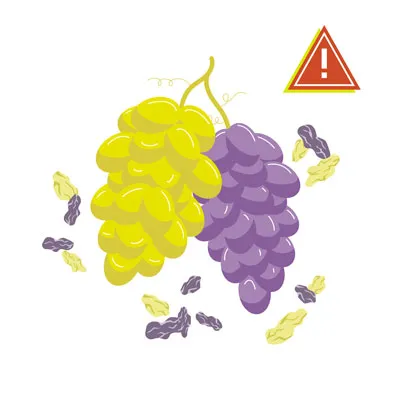 A dog looking longingly at a bowl of grapes, which are highly toxic.
A dog looking longingly at a bowl of grapes, which are highly toxic.
What To Do if Your Dog Eats Something Toxic
If your dog consumes a toxic food, immediate action is crucial.
Familiarize yourself with the symptoms of food toxicity so you can quickly recognize an issue. Symptoms vary depending on the ingested substance but can include listlessness, distress, pain, vomiting, bloody stools, or a bloated, hard-feeling stomach (which can indicate a life-threatening condition).
If you observe these symptoms, do the following:
- Call your veterinarian or poison control right away: Timing is vital. Prompt treatment often leads to more successful outcomes and shorter hospital stays.
- Be prepared with information: Have details ready, such as the type of food eaten, the estimated amount consumed, and the time of ingestion.
- Avoid home remedies: Do not attempt home remedies unless specifically instructed by your veterinarian. Remedies vary depending on the toxic substance, and even inducing vomiting can be harmful in certain situations.
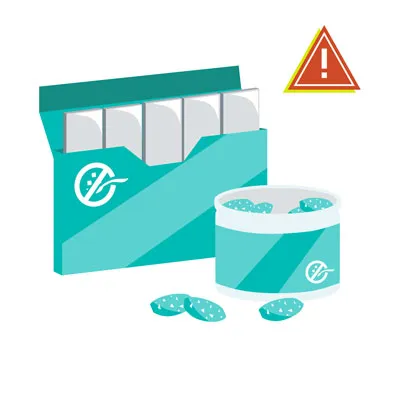 A dog near a packet of sugar-free gum, which often contains xylitol, a highly toxic ingredient for dogs.
A dog near a packet of sugar-free gum, which often contains xylitol, a highly toxic ingredient for dogs.
Dog Care Story Can Help You Keep Your Dog Healthy
Navigating the world of human foods that can affect your dog can be challenging. Between common household toxins and dangerous foods, staying vigilant is key to protecting your beloved companion. By adhering to this guide and maintaining awareness, you can significantly reduce the risks of your dog encountering harmful substances.
The good news is that there are numerous safe and healthy foods your dog can enjoy! Explore our list to discover which treats your dog loves and offer them as rewards. If you are ever unsure about a particular food, always consult your veterinarian for guidance. For more in-depth information on pet care and nutrition, visit Dog Care Story.
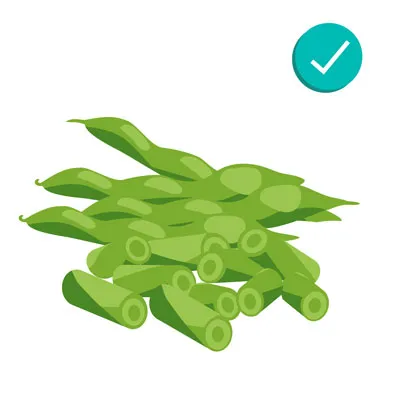 A dog enjoying a healthy snack of green beans, a safe and nutritious option.
A dog enjoying a healthy snack of green beans, a safe and nutritious option.
References
- Parker, H. (2023, May). Top 10 dog poisons. WebMD.
- Colorado State University. (2023, October). What happens if a dog eats chocolate?
- American Kennel Club. (2024, March). Fruits and vegetables dogs can or can’t eat.
- Klein, J. (2023, July). What to do if your dog drinks alcohol. American Kennel Club.
- Joy, H. (2022, December). Can dogs eat apples? PetMD.
- Koschalk, K. (2023, July). Can dogs eat plums? Chewy.
- Hayes, C. (2024, September). Avocado (Persea spp) Toxicosis in Animals. Merck Veterinary Manual.
- ASPCA. (n.d.). People foods to avoid feeding your pets.
- American Kennel Club. (2024, March). People foods dogs can and can’t eat.
- Ardente, A. (2023, January). Can dogs eat nuts? PetMD.
- Mitchell, S. C. (2024, January). Can dogs drink milk? PetMD.
- Morrison, B. J. (2023, November). Can dogs have nutmeg? PetMD.
- Schmid, R., et al. (2024). Onion, garlic, chive, and leek poisoning in dogs. VCA Animal Hospitals.
- Burke, A. (2024, October). Can dogs eat tomatoes? American Kennel Club.
- Ripley, K. (2023, November). Can dogs eat potatoes? American Kennel Club.
- American Kennel Club. (2023, June). What to do if your dog eats a cigarette butt.
- Goldstein, L. (2024, July). Dough & dogs: Why it’s bad and what you can do. Preventive Vet.
- Pet Poison Helpline. (n.d.). Rhubarb.
- Logue, H. (n.d.). Can dogs drink carbonated water? Rover.
- Malmanger, E. (2024, February). What fruits can dogs eat? PetMD.
- Burke, A. (2022, August). Can dogs have green beans? American Kennel Club.
- CDC. (2024, April). About pet food safety.
